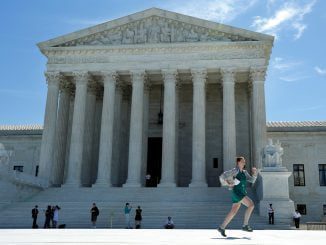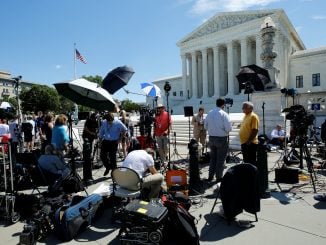
RALEIGH — Justices on the U.S. Supreme Court questioned the continued use of race-based college admissions practices involving two such cases during oral arguments heard on Oct. 31.
The justices were in no rush, taking five hours to hear oral arguments – around three of which were spent on the case involving the challenge to UNC Chapel Hill’s admissions policies.
The cases involving Harvard University and the University of North Carolina Chapel Hill were initiated by Students for Fair Admissions (SFFA), a Virginia-based group founded by Edward Blum, who serves as the group’s president. SFFA has contended that Asian students are penalized in admissions whereas Black and Hispanic students are awarded “massive preferences.”
The Supreme Court’s 2003 ruling in Grutter v. Bollinger was prevalent during oral arguments, but both sides also touched on a related earlier case, University of California v. Bakke (1977), as well as Brown vs. the Board of Education.
Grutter held that the Equal Protection Clause of the Fourteenth Amendment did not prohibit “narrowly tailored use of race in admissions decisions to further a compelling interest in obtaining the education benefits that flow from a diverse student body.”
“We expect that 25 years from now, the use of racial preferences will no longer be necessary to further the interest approved today,” former Justice Sandra Day O’Connor wrote in the majority opinion in Grutter.
O’Connor’s 25 years would place a possible end to those racial preferences in 2028, however, the tone of the Oct. 31 oral arguments may indicate the high court may end those practices after 19 years instead.
“I don’t see how you can say that the program will ever end,” Chief Justice John Roberts told attorneys defending the practice of using race in college admissions.
On the same note, Justice Elena Kagan questioned why “after 20 years,” universities can’t use race-neutral practices. General Elizabeth Prelogar, the solicitor general for the Department of Justice, cited service academies as having looked for other means, but “I can’t say that we are able to get there all the way right now with race-neutral alternatives.”
In defending UNC Chapel Hill’s use of race in its admissions process, North Carolina Solicitor General Ryan Park, brought up the 1954 landmark case Brown v. Board of Education which held racial segregation in public schools was unconstitutional.
Park said in his opening statement that UNC Chapel Hill “seeks to fulfill Brown’s vision by assembling a student body that is diverse along the many dimensions that matter in American life, including race, but also social class, geography, military status, intellectual views, and much more.”
“Mr. Park, I’ve heard the word “diversity” quite a few times, and I don’t have a clue what it means. It seems to mean everything for everyone,” said Justice Clarence Thomas following Park’s opening statement.
Thomas repeatedly pressed lawyers defending the schools to define diversity and to explain the educational benefits of racial diversity on campus.
Thomas asked Park to tell him “What the educational benefits are.” Without actually answering Thomas’ question, Park defended the university’s use of race by saying it’s one of many factors the university considers and applicants volunteer that information.
“I may be tone-deaf when it comes to all these other things that happen on campus, about feeling good and all that,” Thomas said to David Hinojosa, the attorney representing student respondents. “I’m really interested in a simple thing: What benefits academically are there to your definition or the diversity that you’re asserting.”
In a similar line of questioning, Justice Samuel Alito, Jr. wanted to know how the court was supposed to know whether or not the benefits of racial diversity have been achieved.
Thomas also countered arguments by UNC Chapel Hill that without considering the race of an applicant, one cannot consider the whole person.
“The assumption that race necessarily informs something about anyone’s qualifications is antithetical to this Court’s precedence and to our Constitution,” Thomas said.
Justice Brett Kavanaugh referred to the nine states that stopped using race in the admissions process for their public universities since the Grutter decision as examples of race-neutral programs that “produce significant numbers of minority students on campus.”
Justice Sonia Sotomayor took a different route, noting nine states that have done away with affirmative action-style admissions have seen decreased minority enrollment.
The nine states referred to by Kavanaugh include California (1996), Washington (1998), Florida (1999), Michigan (2006), Nebraska (2008), Arizona (2010), New Hampshire (2012), Oklahoma (2012), and Idaho (2020).
In the case of California, the California state campuses have had challenges recruiting minority students yet the system’s current enrollment “nearly fully reflects the state’s diversity” and “among its 422,391 undergraduates in fall 2021, 47% are Latino, 21% white, 16% Asian and 4% black,” per a report by the Los Angeles Times on Oct. 31, 2022.
The practice of assigning points or personal scores to portions of an application was discussed several times throughout the arguments.
Justice Ketanji Brown Jackson participated in the UNC oral arguments but has recused herself in the Harvard case due to recent service on a Harvard board.
Jackson asked SFFA’s attorney Patrick Strawbridge whether UNC Chapel Hill was replying only on race in its admissions. Jackson also questioned if any applicants were really being harmed by the practice.
Strawbridge cited UNC’s expert witness who said that 1.2% of admissions decisions were tied to race. He went on to say that with 40,000 applicants a year, which meant hundreds or even thousands of applicants could be affected.
Alito Jr. had some back-and-forth questions with Seth Waxman, an attorney for Harvard, on why Asian students “get the lowest personal scores” of any group in Harvard’s admissions process.
Waxman initially tried to respond by citing a study from 1983, but Alito cut him off and asked him again. Waxman said there was a “slight numerical disparity” and cited lower court findings of “no evidence of discrimination in admissions outcomes.”
“I still haven’t heard any explanation for the disparity between the personal scores that are given to Asians,” Alto countered. “They rank below whites. They rank way below Hispanics and really way below African Americans.”
Waxman then claimed personal ratings assigned by an admissions officer were “just as a matter of triage” and that the score later “fades into the background” and is “not the basis of admissions decisions.”
Following the oral arguments, UNC Chapel Hill Chancellor Kevin Guskiewicz was among those who gave remarks to the press in front of the Supreme Court building.
Guskiewicz stated diversity is a “fundamental value” and the reason UNC Chapel Hill believes in “holistic admissions.”
“We heard a lot today in the courtroom about the importance of protecting our democracy,” Guskiewicz said. “And as a faculty member of 27 years at North Carolina and as the chancellor for over three years, I’m on the front line. I see the importance every day of diversity.”
Guskiewicz went on to praise their legal counsel and when reporters asked questions he “refused to speculate” about the outcome of the case.
Both sides of each of the cases have seen dozens of support amicus briefs.
Ten current and former Democratic governors from six southern states, including North Carolina’s Democratic Governor Roy Cooper, have filed a brief in support of UNC Chapel Hill and Harvard.
North Carolina’s Mark Robinson and Virginia’s Winsome Sears, who are both the first black lieutenant governors in their respective states, filed a joint brief in support of SFFA and Asian students.
The nation’s high court is expected to rule on the cases before next summer; likely sometime in June.




